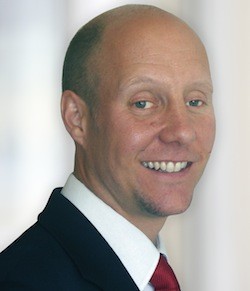Opinions vary widely about the merits of swap execution facilities, how the new business will unfold and play out, and which SEFs will win market share. But there is at least one immutable truth: for end users, SEFs are not optional.
Trading and investing firms that buy and sell interest-rate swaps and credit-default swaps have largely resigned themselves to the inevitability of SEFs, which has advanced the discussion to the pros and cons of SEFs, and what the SEF-trading experience will be like.
For many market participants, SEFs are a mixed bag. The broad aims of more transparency and bolstered market stability are positive, and a SEF system could streamline a firm’s trading process. But transitioning from over-the-counter trading to SEF trading is not costless, and some details in the rules are cause for concern.

Paul Squires, Axa
“It’s fairly linear — a centralized clearing capacity is good for the trader but expensive to set up,” said Paul Squires, head of trading at Axa Investment Managers, which has traders in Paris, London, and Greenwich, Conn.
Under the current but ‘lame duck’ OTC trading system, “you are very much constrained either by your client or by your internal risk department’s exposure limits around who you can execute with,” Squires said. “To some extent, removing those constraints is good for our trading desk. However to get to that point of setting yourself up and meeting those requirements involves a lot of work, and work equals cost.”
The go-live date for mandatory trading through SEFs is Nov. 1, which was pushed back a month from Oct. 2 by the U.S. Commodity Futures Trading Commission. When SEF trading does commence in earnest, a gradual and perhaps lengthy ramp-up in activity is expected, as investors calibrate their comfort levels amid rule interpretations and the ironing out of operational kinks.
Optiver may trade swaps through swap execution facilities — one day. For now, the proprietary trading firm will watch and wait to see if the SEF space delivers on its promise.
“Optiver has always been a firm that championed the level playing field brought by exchange-traded and centrally cleared products,” said Pat Hickey, the company’s Chicago-based head of market structure. “Traditionally, interest-rate swaps were in the bilateral, over-the-counter space, so we welcome the transition to something more transparent.”
Maybe Later
“Our understanding is that first these products are going to first be centrally cleared and then later perhaps trade on a central limit order book,” Hickey continued. “At that point, the products might prove interesting, as they will then share a lot of the positives we find with transparent markets.”
SEF rules will be largely indicative rather than binding at least through Nov. 1, and operational protocols will be a work in progress for some time. Some of the rules could use some revision and streamlining, according to market participants.
“There is unnecessary complexity to the rules and the rule-making process,” Hickey said. “A lot of the things that are called for in the rules require a parallel but redundant business and compliance structure to something that that we already have, to help support a swaps product line that has yet to trade in a predominantly transparent fashion.”
Other potentially problematic aspects to a SEF regime include competing rates products recently introduced by futures exchanges, a rule that doesn’t mandate a swap dealer to seek more than two quotes for a given swap, and an indication that some SEFs will require traders to have execution agreements with every other participant on that SEF. “There’s a long way to go until the whole structure sorts itself out,” Hickey said.
The transition to SEFs represents a sea change in how swaps are traded, as such it’s no surprise that there is some measure of wariness on the part of market participants. But like other changes over the years, a viable system is expected to emerge once the smoke clears.
“I can’t call myself a SEF enthusiast — I think all marketplaces should be voluntary rather than mandated,” said David Long, chief investment officer for asset/liability management, derivatives, and fixed income at the $47 billion Healthcare of Ontario Pension Plan. “But I have faith that over time, it will work out. I think people, including market makers and investors, will find ways of adapting to the new environment and ways of getting our trades done.”

